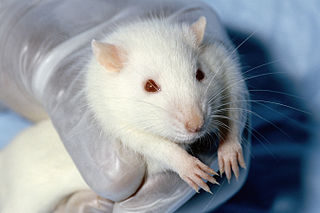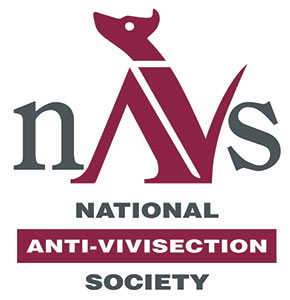Related Research Articles

Animal welfare is the well-being of non-human animals. Formal standards of animal welfare vary between contexts, but are debated mostly by animal welfare groups, legislators, and academics. Animal welfare science uses measures such as longevity, disease, immunosuppression, behavior, physiology, and reproduction, although there is debate about which of these best indicate animal welfare.

Animal testing, also known as animal experimentation, animal research, and in vivo testing, is the use of non-human animals, such as model organisms, in experiments that seek to control the variables that affect the behavior or biological system under study. This approach can be contrasted with field studies in which animals are observed in their natural environments or habitats. Experimental research with animals is usually conducted in universities, medical schools, pharmaceutical companies, defense establishments, and commercial facilities that provide animal-testing services to the industry. The focus of animal testing varies on a continuum from pure research, focusing on developing fundamental knowledge of an organism, to applied research, which may focus on answering some questions of great practical importance, such as finding a cure for a disease. Examples of applied research include testing disease treatments, breeding, defense research, and toxicology, including cosmetics testing. In education, animal testing is sometimes a component of biology or psychology courses.

Beak trimming, or beak conditioning, is the partial removal of the beak of poultry, especially layer hens and turkeys, although it is also be performed on some quail and ducks. When multiple birds are confined in small spaces due to farming practices, they are more likely to hurt each other through pecking. Beak trimming aims to avoid damage done by pecking, although the practice is criticized by animal welfare organizations and banned in several European countries. Beak trimming is most common in egg-laying strains of chickens. In some countries, such as the United States, turkeys routinely have their beaks trimmed. In the UK, only 10% of turkeys are beak trimmed.

Vivisection is surgery conducted for experimental purposes on a living organism, typically animals with a central nervous system, to view living internal structure. The word is, more broadly, used as a pejorative catch-all term for experimentation on live animals by organizations opposed to animal experimentation, but the term is rarely used by practising scientists. Human vivisection, such as live organ harvesting, has been perpetrated as a form of torture.
Cruelty Free International is a British animal protection and advocacy group that campaigns for the abolition of all animal experiments. They organise certification of cruelty-free products which are marked with the symbol of a leaping bunny.
Exsanguination is the loss of blood, usually leading to death. Depending upon the health of the individual, people usually die from losing half to two-thirds of their blood; a loss of roughly one-third of the blood volume is considered very serious. Even a single deep cut can warrant suturing and hospitalization, especially if trauma, a vein or artery, or another comorbidity is involved. The word comes from the Latin 'sanguis', meaning blood.

In Judaism, shechita is ritual slaughtering of certain mammals and birds for food according to kashrut.

The Animals Act 1986, sometimes referred to as ASPA, is an Act of the Parliament of the United Kingdom passed in 1986, which regulates the use of animals used for research in the UK. The Act permits studies to be conducted using animals for procedures such as breeding genetically modified animals, medical and veterinary advances, education, environmental toxicology and includes procedures requiring surgery, if certain criteria are met. Revised legislation came into force on 1 January 2013. The original act related to the 1986 EU Directive 86/609/EEC which was updated and replaced by EU Directive 2010/63/EU

Institutional Animal Care and Use Committees (IACUCs) are centrally important in applying laws about animal research in the United States. Similar systems operate in other countries, but generally under different titles; for example, in Canada a typical title would be the University Animal Care Committee (UACC), while in the United Kingdom it would be the Animal Welfare and Ethical Review Body (AWERB).
The Animal Procedures Committee advised the British Home Secretary on matters related to animal testing in the UK. The function of the committee was made a statutory requirement by the Animals Act 1986, which mandated that it should have at least 12 members, excluding the chair. The APC no longer exists as the ASPA has been revised in accordance with EU legislation. It was disbanded on 31 December 2012 and was replaced by the Animals in Science Committee in 2013.

Cambridge University primate experiments came to public attention in 2002 after the publication that year of material from a ten-month undercover investigation in 1998 by the British Union for the Abolition of Vivisection (BUAV). The experiments were being conducted on marmosets, and included the removal of parts of their brains intended to simulate the symptoms of stroke or Parkinson's disease. Some of the research was theoretical, aimed at advancing knowledge of the brain, while some of it was applied.
Gillian Rose Langley is a British scientist and writer who specialises in alternatives to animal testing and animal rights. She was, from 1981 until 2009, the science director of the Dr Hadwen Trust for Humane Research, a medical research charity developing non-animal research techniques. She was an anti-vivisection member of the British government's Animal Procedures Committee for eight years, and has worked as a consultant on non-animal techniques for the European Commission, and for animal protection organizations in Europe and the United States. Between 2010 and 2016 she was a consultant for Humane Society International.

The National Anti-Vivisection Society (NAVS) is an international not-for-profit animal protection group, based in London, working to end animal testing, and focused on the replacement of animals in research with advanced, scientific techniques. Since 2006, the NAVS has operated its international campaigns under the working name Animal Defenders International (ADI), and the two groups now work together under the ADI name.

Experiments involving non-human primates (NHPs) include toxicity testing for medical and non-medical substances; studies of infectious disease, such as HIV and hepatitis; neurological studies; behavior and cognition; reproduction; genetics; and xenotransplantation. Around 65,000 NHPs are used every year in the United States, and around 7,000 across the European Union. Most are purpose-bred, while some are caught in the wild.

The Boyd Group is a Britain-based, independent think tank considering issues relating to animal testing.

Animal testing regulations are guidelines that permit and control the use of non-human animals for scientific experimentation. They vary greatly around the world, but most governments aim to control the number of times individual animals may be used; the overall numbers used; and the degree of pain that may be inflicted without anesthetic.

Pain negatively affects the health and welfare of animals. "Pain" is defined by the International Association for the Study of Pain as "an unpleasant sensory and emotional experience associated with actual or potential tissue damage, or described in terms of such damage." Only the animal experiencing the pain can know the pain's quality and intensity, and the degree of suffering. It is harder, if even possible, for an observer to know whether an emotional experience has occurred, especially if the sufferer cannot communicate. Therefore, this concept is often excluded in definitions of pain in animals, such as that provided by Zimmerman: "an aversive sensory experience caused by actual or potential injury that elicits protective motor and vegetative reactions, results in learned avoidance and may modify species-specific behaviour, including social behaviour." Nonhuman animals cannot report their feelings to language-using humans in the same manner as human communication, but observation of their behaviour provides a reasonable indication as to the extent of their pain. Just as with doctors and medics who sometimes share no common language with their patients, the indicators of pain can still be understood.

In New Zealand, animals are used in many situations for research, testing and teaching (RTT).

The Three Rs (3Rs) are guiding principles for more ethical use of animals in product testing and scientific research. They were first described by W. M. S. Russell and R. L. Burch in 1959. The 3Rs are:
- Replacement:methods which avoid or replace the use of animals in research
- Reduction: use of methods that enable researchers to obtain comparable levels of information from fewer animals, or to obtain more information from the same number of animals.
- Refinement: use of methods that alleviate or minimize potential pain, suffering or distress, and enhance animal welfare for the animals used.

Norbert Lins is a German politician who has served as a Member of the European Parliament (MEP) since 2014. Since 2019, he has chaired the Committee on Agriculture and Rural Development. He is a member of the Christian Democratic Union (CDU), part of the European People's Party (EPP).
References
- ↑ "Animals in Science Committee: What We Do". GOV.UK. Retrieved 15 May 2014.
- ↑ "Animals in Science Committee". RSPCA. 15 May 2014.